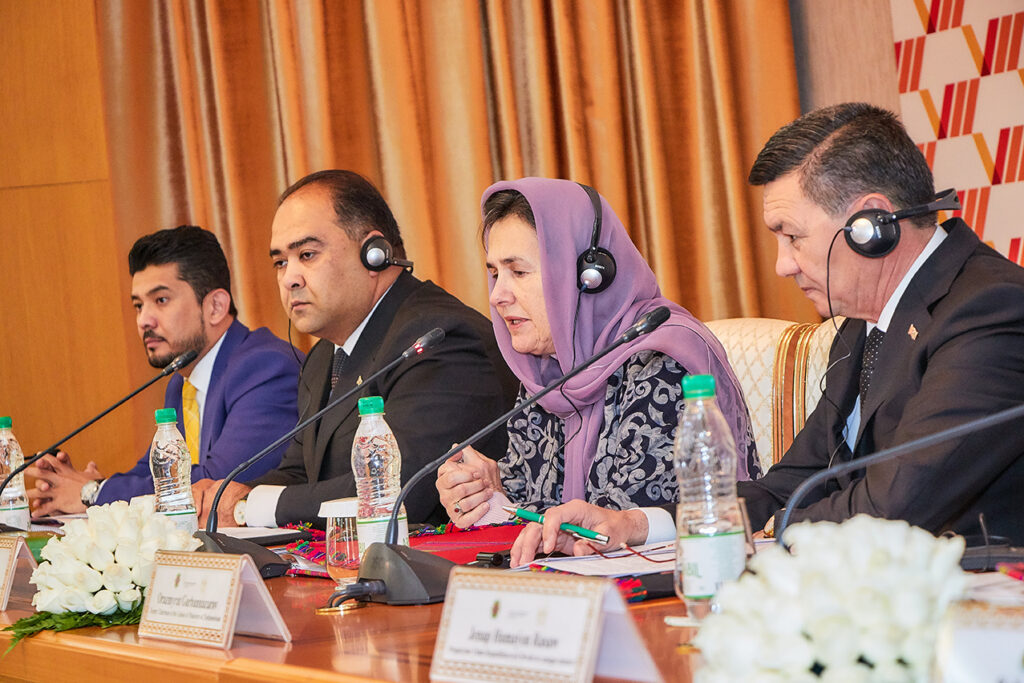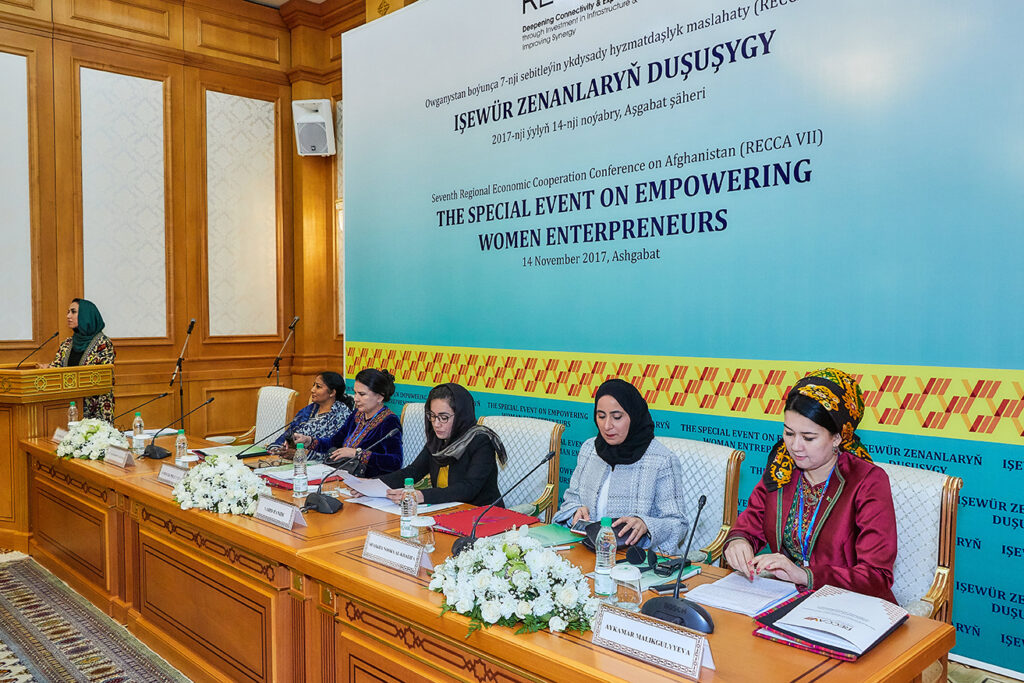The Joint Opening of the Business Forum and the Special Event on Empowering Women Entrepreneurs towards Access to Regional and Global Markets
On November 14th, a joint official opening of the Business Forum and the Special Event on Empowering Women Entrepreneurs inaugurated by the First Lady of Afghanistan, H.E. Rula Ghani; H.E. Orazamyrat Gurbannazarov, the Deputy Chairman of the Cabinet of Minsters of Turkmenistan, H.E. Orazmuradov D. Minister of Trade and Foreign Economic Relations of Turkmenistan; H.E. Humayoon Rasaw, Minister of Commerce and Industries of I.R. of Afghanistan and Heads of Chambers of Commerce of Turkmenistan & Afghanistan.
H.E. the First Lady in her opening remarks spoke about the historic role of merchants in the region in moving not just goods but ideas and practices that today we owe to, our shared culture and similarities.
She stressed the need for the inclusion of women in the economic activities and expressed that “disregarding women’s empowerment and participation in a country is decreasing the speed of development”. She expressed optimism over the gradual increase in women’s economic participation in Afghanistan while highlighting the “need for institutional support to their sustainable and meaningful contribution”.
She expressed that Today’s event is indicative of how RECCA has developed into a leading regional cooperation platform, that builds confidence and benefits the whole region including through promoting the role of women entrepreneurs in economic development and prosperity of the region.
She stated that such activities and events, provide additional professional knowledge and allow women entrepreneurs to connect with regional and multinational enterprises and become part of the regional and global markets.
The Special Event on Empowering Women Entrepreneurs was organized jointly by the RECCA secretariat, MoFA; the Office of H.E. the First Lady; the Afghanistan Women Chamber of Commerce and Industries (AWCCI), Chamber of Commerce and Industry of Turkmenistan and USAID. There were two panel discussions at the special event. The first panel focused on Market Access – Success Stories and the second panel focused on Market Access Requirements and Challenges.

Special Event — Panel 1
Access to Markets: Success Stories
The first panel comprised success stories of the panelists accessing markets and the work that their respective organizations have done to increase women entrepreneurs’ access to markets. The important points raised in the first panel included the following:
Government policies need to create an enabling environment for investment and for women’s entrepreneurship such as providing easy loans with low interest rate can be of high help.
A venture can become successful and can compete in both local and international markets if the commodities produced include raw materials and expertise available in one’s country.
For a woman to gain access to markets, exposure visits and well-planned exhibitions and trade shows are important.
Women are trustworthy in offering genuine products and so they should use their credibility accessing buyers.
The opportunity is promising for Afghanistan’s precious stones and jewelry if access to finance is enhanced and improved infrastructure such as improved mining and laboratories for precious and gemstones are made available in Afghanistan.
The speakers on the first panel were:
- Chayaa Nanjappa Agarwal, Managing Director of Nectar Fresh, India
- Shaikha Noora Al-Khalifa, President of Medpoint, Bahrain,
- Aybolek Pollyyeva and Aykamar Malikgulyyeva Board members of Turkmenistan Union of Industrialists and Entrepreneurs, Turkmenistan
- Nahid Hamidi, Presdent of Shagirf Precious Stones Afghanistan
- Manizha Wafeq, President of AWCCI, Afghanistan (Moderator of the Panel)

Special Event — Panel 2
Access to Markets: Requirements & Challenges
The second panel discussed the challenges that women-owned businesses face in accessing markets:
- Problems such as illiteracy and socio-cultural issues in the region are challenges to women-owned businesses. Illiteracy among women is a challenge also for obtaining good quality workers.
- Challenges of joint ventures/investments in the countries of the region can be turned to opportunities.
- In the South Asian region another challenge is a lack of men’s support to women. So, men need to be educated on women empowerment in particular.
- The Kyrgyz women’s agribusiness association made some achievements through lobbying such as eliminating the Value Added Tax (VAT) for agricultural products.
- Another major challenge to women’s businesses is the quality of their products and lack of awareness among women business owners about quality and standards.
- The challenge of rural women was discussed and it was emphasized that rural women need to be connected to the urban areas.
The speakers on the second panel were:
- Anuja Narain Agarwal, Co-founder of Rupalee, India
- Aziza Yuldasheva, President of Agribusinesses Association, Kyrgyzstan
- Guljemal Kurbanova and Oguljeren Kozakora, Members of Parliament Turkmenistan
- Zubia Zubair, President Z clothing, Pakistan
- Afsana Rahimi, Executive Director of Shayar Media and Advertising Co., Afghanistan
- Parwarish Oryakhail, Board member of AWCCI, Afghanistan (Moderator of the Panel)
Policy Options and Recommendations
- Build export infrastructure and institutional capacity in order to improve access of women to markets within and outside Afghanistan. The export infrastructure and institutional capacity should include quality and standardization guidelines and support, internationally accepted coding for commodities, transportation, e-payment platforms, and improved post offices.
- Implement women friendly policies such as the Women’s Economic Empowerment National Priority Program
- Improve women’s access to finance.
- Enhance regional networking opportunities for women and mainstream women into all other platforms. Governments and international partners can help women’s chambers and business associations to plan outcome and output oriented networking events.
- Gain men’s support to women’s businesses by involving them as mentors, coaches, business partners, buyers or suppliers to women-owned businesses.
- Create Long-term mentorship and coaching opportunities for Afghan women entrepreneurs.Through international partners programs in Afghanistan and in the region a model program can be replicated.
- Create women to women business opportunities and connect rural with provincial women-owned businesses. The AWCCI has started this process but the initiative needs to be enhanced and supported by both the government of Afghanistan and other stakeholders in the private sector.
- Simplify visa processes for business owners in the region through multilateral agreements among countries in the region.
Conclusion
Without political will, adequate infrastructure, a high-caliber legal environment, and proper policies in place for women’s participation—and equally important without implementation of these policies—the region cannot achieve real women’s participation and real women’s economic empowerment.
Enhancing planned interaction and networks of women in the region can be of great help for women to learn and use each other’s hands-on experience. Efforts are necessary to pair up women business owners with each other to enhance experience sharing and hands on learning.
Women business owners need to connect not only with the private sector but also with governments. The Government of Afghanistan needs to achieve best policy practices and business models from the neighboring countries such as providing women with lower interest rate loans and less stringent collateral loan conditions, as well as establishing capacity to support women business export efforts within and outside the country.
Closing Remarks
H.E. Dilbar Nazari, Minister of Women’s Affairs, I.R. Of Afghanistan
H.E. Nazari in her closing remarks, stated that after the fall of the Taliban’s Regime, Afghan women have gradually achieved greater freedom and a series of achievements have paved the way to playing a more important role in society, including in the economic development of Afghanistan.
She expressed that this event was an important step and opportunity to learn from successful experiences and identify challenges and ways to address them and more importantly an opportunity to showcase Afghan women’s products and find markets for them. However, several factors such as insecurity, illiteracy, lack of expertise and skills, lack of access to financial resources and technology are among the challenges identified during the event. She highlighted that market access remains a vital factor for the growth of women-owned businesses.
She suggested that special regional markets should be established for women along with regional exhibitions in different countries for showcasing their products.
